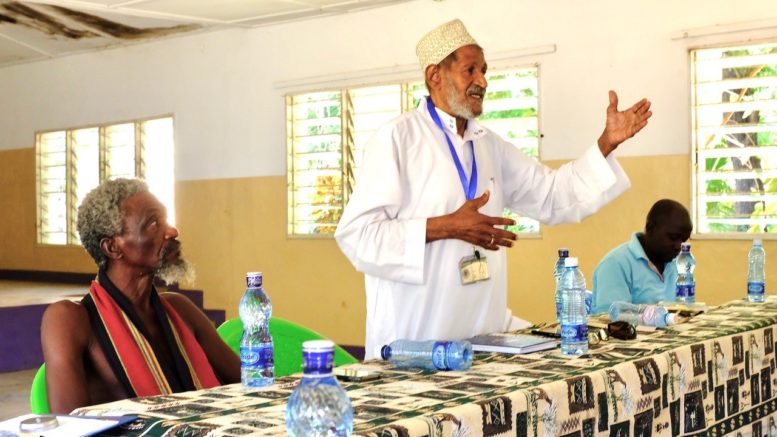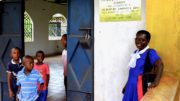The Coast Interfaith Council of Clerics works for social cohesion and development and is active to prevent violence.
We are welcomed by Bishop Amos Lewa and then asked to introduce ourselves: We have gathered with about 20 religious leaders in a conference room in Malindi, a coastal town three driving hours north of Mombasa. Church leaders, imams and kayas – clergymen of the African traditional religion – have come together for a meeting. Amos Lewa is the Bishop of the Joy Fellowship Ministries, a Pentecostal church and Board member of Coast Interfaith Council of Clerics Trust (CICC).
I am together with two members of the German Bundestag (Parliament), Heribert Hirte (CDU) and Karl-Heinz Brunner (SPD) as well as a staff member from the German Federal Ministry for Economic Cooperation and Development (BMZ). We are on „Exposure“ at the Kenyan coast. This makes us part of a 19-member delegation, including four parliamentarians, two representatives of the BMZ, the managing director of Islamic Relief Germany, an archbishop and leading multipliers from the church. For four days our delegation has split up into different regions for „Exposure“. This dialogue and learning trip runs under the headline of „Religions as partners for peace, security and development?“ and was organized in February 2020 by the association Exposure and Dialogue Programs in cooperation with the Catholic Personnel Service AGIAMONDO.
CICC is an unusual inter- and intra-religious association. Next to Bishop Lewa there are a Sheikh and a Kaya, the two co-chairs in the region. Lewa reports: The starting point for the creation of the CICC was the political and extremist violence in the coastal region in 1997. A loose network was formed to deal with and overcome acute political violence. After all, religious leaders had founded CICC to contribute to peaceful coexistence through dialogue and very concrete help and projects. As a consequence of 11 September 2001 the conflicts in the region increased again and CICC was established as a trust in 2005. In the following years, the organization was transformed not only into a comprehensive dialogue forum of the religions, but also into a committed non-governmental organization with 23 full-time staff, which carries out a wide variety of projects and initiatives.
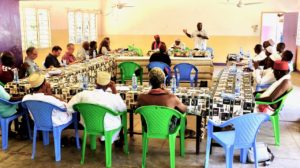
CICC meeting in Malindi with Bishop Lewa, standing, the co-chairs, an Imam and a Kaya, sitting next to him
The CICC Trust has eight members with equal rights: African Traditional Religions, Catholic Church, Council of Imams and Preachers of Kenya, Evangelical Alliance of Kenya, Hindu Council of Kenya, National Council of Churches in Kenya, Organization of African Instituted Churches and Supreme Council of Kenya Muslims. Each group sends two representatives to the Board.
The coast of Kenya is a neglected region concerning its economic and social development. The mostly small-scale agriculture is not very productive and is further burdened by climate change. Youth unemployment is extremely high. As a consequence of the intervention of the Kenyan military in Somalia in 2011, there have been repeated armed attacks and abductions by Al-Shabaab from Somalia. Unemployed young people are recruited by Al-Shabaab as fighters. Against this background, one goal of CICC’s work is to reduce economic marginalization and strengthen food security through „faith-centered environment stewardship“. Here, as well as with the goal of strengthening harmonious and peaceful coexistence in and between communities, inter-religious dialogue and faith-based approaches are of central importance. Religious leaders have a key role to play.
Heribert Hirte and I can observe how this works exactly by looking at the work of our host Lynette Shaha and her husband Moses in the coastal town of Kilifi. On dirt roads through the labyrinth of the bustling old centre we reach their small house. In the heavy rain everything here looks like it would sink into the mud. Lynette is a trained evangelist of the Anglican Church and volunteers for CICC in various functions as community worker and activist.
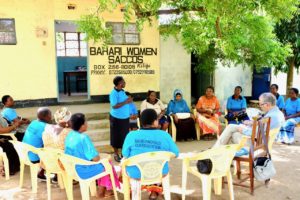
Bahari Women Saccos with Lynette Shaha, standing in the centre
We rumble in a Tuk Tuk across the tarmac road to the Bahari Women Saccos on the outskirts of Kilifi. Saccos are microcredit initiatives. Lynette is the chairwoman of the Bahari Women. Of the 16 women who have gathered under a tree, a good third are Muslim. The initiative has around 200 members. The women present are multipliers who take part in a training course organised by the umbrella organisation of savings and credit cooperatives in Kenya. The speaker from KUSCCO (Kenya Union of Savings & Credit Co-Operatives) explains technical and legal issues. And she addresses the topic of advocacy and the use of social media via mobile phone. The organisation even offers the Saccos insurance for loan losses. Almost all the women in the group also run their own small businesses more or less successful. They tell us about beauty salons, the production of sweets from baobab seeds, coconut oil production and even the production and sale of stones for building houses.
The next morning a Tuk Tuk brings us to Mnarani, about five kilometres south of Kilifi, to a Pentecostal church under the responsibility of Bishop Lewa. This is where a group of CICC community workers meet to plan their activities for the next six months. Again, Lynette chairs the group and leads it with great authority and a firm hand. I count nine Christian women, six Muslim women, and one adherent of the traditional African religion. One Muslim woman says a prayer to open the round table. In a first exchange, the problem of drug abuse and the radicalisation of young people is raised several times. „We must take better care of our children. We must take more time for them and make this clear to our men,“ says one woman. Domestic violence and abuse are also an issue. „Only if we as Christians, Muslims and members of the African religion work together can we strengthen our communities,“ emphasizes a participant. Many of them are undoubtedly real leaders and radiate an incredible energy. In this round, they have a space where they can speak openly and strengthen each other.
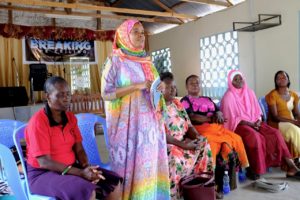
Community workers from CICC
The topics of domestic violence and men are also discussed in a small group. After the first hesitation, a woman dares to say: „The men are also the problem. We have to work on that.“ Back in the large group the point is only cautiously addressed. Later in the evening, as we reflect on our observations with Lynette, we find a more nuanced formulation: „It’s not religions that are the problem. It’s largely male-dominated traditions and cultures that create problems.“
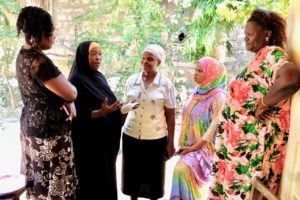
Activists in conversation
Back to Mnarani. The assembly agrees on planning a whole range of concrete activities, for example the education and empowerment of women and youth through theatre or acrobatics. Mothers and fathers are to be addressed even more specifically. Dialogue with police and security forces is to be intensified. And as with the Bahari Women: „We must learn to understand social media better and use them in a more targeted way.“ In this round, too, most women seem to successfully run small businesses. The meeting ends with the prayer of a Christian woman, then there is a snack.
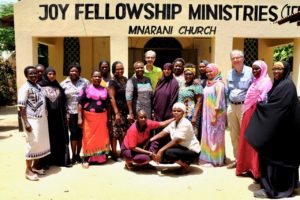
After the meeting
In the afternoon we visit Mumina Alaso Mohamed and her women’s group in Kiwandani, a particularly poor district of Kilifi. Mumina was there in the morning group as well. Here we can see with our own eyes that she is indeed a successful businesswoman. With the help of small loans she has built up a well-running small shop. She rents out the plastic chairs on which we sit for weddings and other family celebrations. The women’s group talks mainly about domestic violence and about the neglect of children. For certain issues, the community worker can refer to CICC’s counselling services. Mumina also supports the women in her neighborhood in other ways. She takes out a notebook, receives small amounts of money from the women and carefully enters each amount in a list. The women want to avoid their husbands spending the money on alcohol or other things and at the same time they want to save up for necessary purchases. In the bank that Mumina uses for her own shop, they know their money is safe.
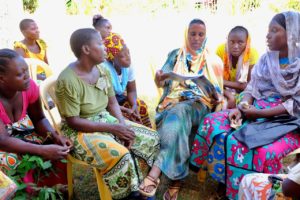
Mumina – in the centre – with her women’s group
On Sunday Lynette and Moses take a borrowed car to drive us on a very bad sand road to their village community. The Anglican service is led by Lynette. The night before, she had written down the contents of her sermon for us in English and printed it out in a copy shop early in the morning because she doesn’t have her own printer. This way we can follow the service and her sermon without translation. The level of energy Lynette works with is impressive, she supports her women’s groups and cooks for Moses and us. She also supports her daughter, who lives in the neighbourhood with her grandchildren. Every day begins and ends for her and us with a devotional service in the living room, where we also have our meals.
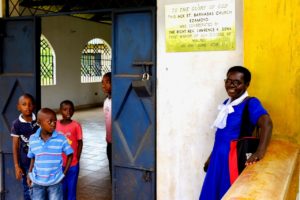
Lynette Shaha outside her church
There are many such deeply religious and strong leaders who carry and shape the work of CICC. On the one hand CICC works explicitly on an intra- and inter-religious level. With religious leaders – mostly men who are usually below 40 years – CICC representatives discuss quotations from the Bible and the Quran, which elsewhere are repeatedly used to devalue other religions and to legitimize violence. Ethnic conflicts are also addressed by the multipliers.
The fact that CICC has achieved great success in this is due to the network of clergymen and countless volunteers that has grown over the years at local and regional level. Trust has been built up and prejudices have been reduced. The actors make intensive use of WhatsApp groups, Facebook, Twitter or the CICC website. This strengthens local identities and enables bonding. People can be reached and mobilized through religious structures. On the other hand, CICC’s strength lies in practical cooperation in social and development projects. Concrete grievances and problems can be tackled. In agricultural projects, farmers are supported in adapting to climate change or in marketing their products. Women are specifically promoted. Neighbourhood groups are accompanied. Programmes are offered for unemployed young people.
CICC is in contact with local police and security forces and can therefore address misconduct when necessary. There is cooperation and exchange with other non-governmental organisations. International donors or the German Gesellschaft für Internationale Zusammenarbeit (GIZ) have also become aware of CICC’s work. For national and international networking, CICC maintains an office in the capital Nairobi. Last but not least, CICC is supported by an AGIOMONDO expert from the German Civil Peace Service (ZFD) programme who works in Mombasa.
Back to the meeting of religious leaders in Malindi mentioned at the beginning. I could hardly believe that in this meeting Catholics, Muslims, Anglicans, Evangelicals, Pentecostals and traditional African religious leaders, Kayas, are working together on an equal footing and with success. Indeed, in the founding phase of CICC there was considerable resistance to the participation of the Kayas. Certainly, a lot of time and patience was needed to dispel mistrust, prejudices and resistance among all participants. On our inquiry we learned that there are still „hardliners“ in the religions and denominations who evade cooperation. Nevertheless, the trust and network that has grown up with and through CICC is impressive. And perhaps CICC will even succeed in making further progress in questions of gender justice.
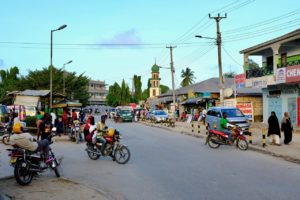
Street scene in Kilifi
Particularly in a part of the country where state infrastructure is weak or hardly available, civil society structures have been strengthened with the authority of clergy of all local religions. Although extremist violence could not be completely prevented, it has been strongly contained. And it is through this infrastructure that development programmes could and can be implemented particularly effectively and sustainably. At the time of our visit, Covid-19 had clearly not yet reached the region. No matter how the pandemic should spread further in Kenya, the grown structures of CICC should play a central role in the fight against the corona virus and be very helpful.
8 April 2020 – Tim Kuschnerus
All photos by Tim Kuschnerus
_______________________________________
Tim Kuschnerus is managing director of the Joint Conference Church and Development (GKKE). GKKE was founded in 1973 as an ecumenical, Protestant-Catholic working group on development policy. GKKE holds dialogues with parliament and government as well as social interest groups on questions of international cooperation and Just Peace. GKKE is supported by the German Commission Justitia et Pax and by Bread for the World. Chairmen are the representatives of the two major Christian churches to the Federal Government in Berlin: Prelate Dr. Martin Dutzmann, Plenipotentiary of the Council of the Evangelical Church in Germany (EKD) and Prelate Dr. Karl Jüsten, Head of the Commissariat of German Bishops.

